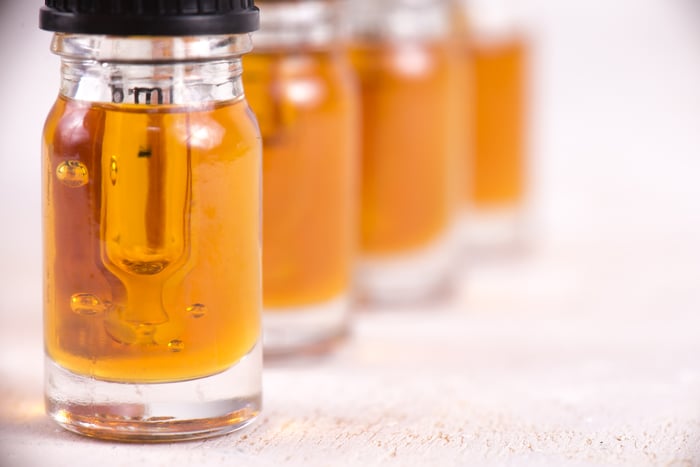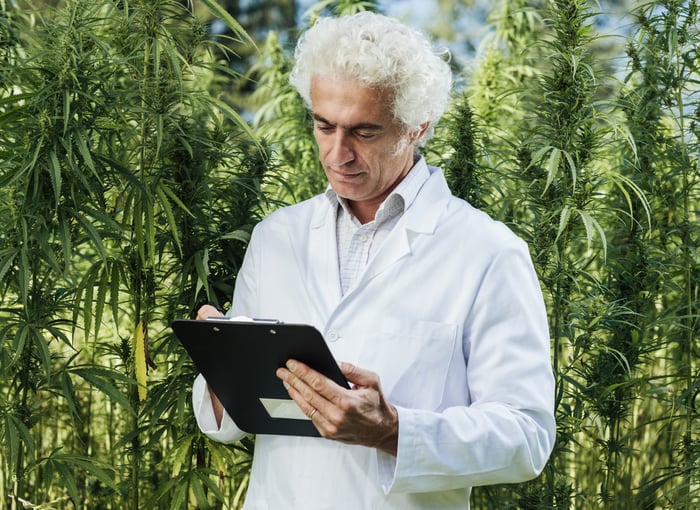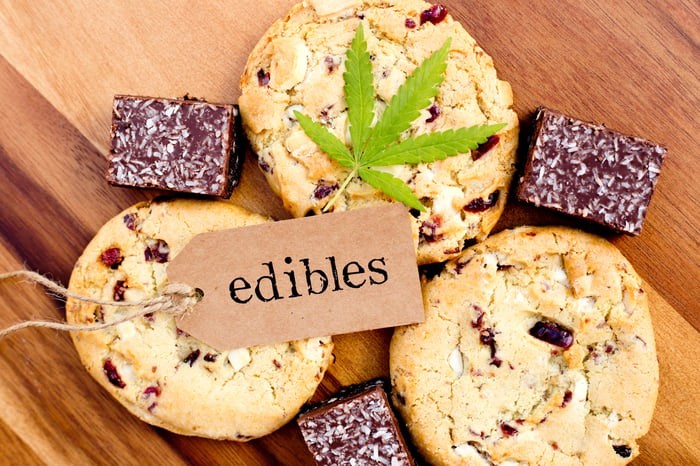When 2019 began, it was expected to be an incredibly "green" year for the cannabis industry. Canada had just commenced recreational weed sales in October 2018; higher-margin derivative products were expected to hit dispensary shelves in Canada soon thereafter; and President Trump had just signed the farm bill into law, thereby legalizing the industrial production of hemp and hemp-derived cannabidiol (CBD).
Arguably, the greatest excitement surrounded CBD, the nonpsychoactive cannabinoid that's best known for its perceived medical benefits. Since CBD doesn't get users high, there's a considerably broader patient pool for infused products than anything marijuana related. And it also doesn't hurt that the U.S. population is considerably larger than Canada, providing a juicier opportunity for the CBD industry.

Image source: Getty Images.
Moreover, with President Trump signing the farm bill into law, it allowed general stores, such as pharmacies and grocers, the opportunity to carry hemp-derived CBD products. In other words, no longer are CBD products carried only in cannabis dispensaries. This more encompassing retail presence should provide a boost to industry sales.
According to the Brightfield Group, U.S. CBD product sales are expected to increase from around a pedestrian $600 million in 2018 to $23.7 billion by 2023. For those of you keeping score at home, this is, indeed, a compound annual growth rate of more than 100% per year over a five-year stretch. This makes CBD a much faster-growing niche than cannabis as a whole.
The FDA lays the hammer down on CBD
And yet, this rapidly growing niche is clouded in worry following a Nov. 25 consumer update from the U.S. Food and Drug Administration (FDA). To quickly summarize the consumer update, the FDA:
- Noted that CBD has the potential to harm consumers.
- Pointed out that CBD has the potential to cause side effects that might not immediately be noticed by consumers.
- Admitted that there are numerous important aspects about CBD that the agency doesn't know.

Image source: GW Pharmaceuticals.
In particular, the FDA alluded to the only cannabis-derived drug, GW Pharmaceuticals' (GWPH) Epidiolex, as evidence of these bullet points. Despite GW Pharmaceuticals' lead drug being approved as a treatment for two rare forms of childhood-onset epilepsy in June 2018, Epidiolex was also shown to cause liver injury during clinical studies in some patients. Again, this risk didn't outweigh the benefits GW Pharmaceuticals' drug provided in terms of reducing seizure frequency from baseline, but it demonstrates in the eyes of the FDA that CBD doesn't have a clean bill of health.
This FDA consumer update comes as the agency has been reviewing the compound as an additive to food, beverages, and dietary supplements. The FDA's findings, based on the update, suggest that the agency is not going to grant companies the ability to add CBD to food, beverages, or dietary supplements at this time. And, as you can imagine, this news wasn't taken well by Wall Street and investors.
Four things you should know about the FDA's consumer update on CBD
However, it's important for investors to understand that this FDA update isn't as bad as it initially sounds. Here are four important takeaways from the FDA's CBD guidelines.
1. This move had been telegraphed for months
For starters, the FDA's consumer update that was critical of CBD's safety could be seen coming months in advance. Remember, the agency never said it would release concrete guidelines by late summer or early fall. Instead, it only promised to provide an update on the progress it was making in reviewing data and testimony, which it has now done.
Additionally, the FDA hasn't been shy about cracking down on misleading health claims when it comes to CBD. In July, Curaleaf Holdings (CURLF -2.03%), the largest multistate operator in the U.S. by market cap, wound up receiving a warning letter regarding unsubstantiated claims for a variety of CBD products. Even though Curaleaf was quick to respond to these deficiencies, it still wound up costing the company a potentially lucrative distribution deal with CVS Health.

Image source: Getty Images.
2. It's going to take years for the FDA to officially set CBD guidelines
Secondly, it's important to realize that developing an official game plan for CBD as an additive to food or beverages is going to take time -- a lot of time.
Former FDA Commissioner Scott Gottlieb, who headed the agency for nearly two years and stepped down earlier this year, commented in March that it typically takes the FDA two to three years to develop the regulatory framework to add a new substance into the food supply. However, Gottlieb notes that because of marijuana's illicit classification at the federal level, as well as CBD being more complex than traditional additives, it could take the agency even longer to establish official guidelines for CBD use.
Gottlieb may not be the head of the FDA any longer, but many of the policies he implemented during his tenure as commissioner are still in place today. Thus, I believe you can take his commentary more as a matter of fact than opinion at this point.
3. This consumer update should have minimal impact on CBD products outside of food and beverages
Third, investors should understand that while the near- and intermediate-term opportunity for infused food and beverage items has been seriously compromised in the U.S., the FDA's consumer update is unlikely to have much (or any) impact on other CBD-containing products. This means that CBD-infused topicals and oils should continue to be popular items for consumers as long as manufacturers avoid unsubstantiated medical claims.
As I recently noted, this means the worries surrounding CBD market share leader Charlotte's Web (CWBHF -9.20%) may be overstated. Charlotte's Web has built its brand on a variety of topical products and oils, and has seen its retail door count more than double from 3,680 stores at the beginning of 2019 to over 9,000 stores through the end of the third quarter. Charlotte's Web's distribution deals with Kroger and Vitamin Shoppe show that it'll be just fine, even if the FDA takes a long time to develop official CBD guidelines.

Image source: Getty Images.
4. Canada's CBD-infused food and beverage industry will see no impact
Lastly, investors should realize that the precautions being taken by the FDA in the U.S. regarding CBD won't have one iota of impact on Canada's launch of CBD-infused foods and beverages. As a reminder, derivatives are set to hit Canadian dispensaries any day now.
For example, Anheuser-Busch InBev (BUD -5.87%) announced last week that it and Tilray (TLRY) will be launching a line of CBD-infused teas throughout Canada this week. Anheuser-Busch and Tilray's joint venture, known as Fluent Beverages, will contain 98% pure CBD, with only trace amounts of tetrahydrocannabinol (THC), the cannabinoid that gets users high. A line of nonalcoholic sparkling beverages is expected to follow in the first quarter of 2020.
The point being that while investors should remain vigilant when researching companies in the CBD space, the FDA's consumer update isn't the death knell it's being made out to be.





